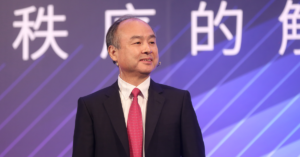The ‘18 hours’ controversy involving Bombay Shaving Company founder Shantanu Deshpande has once again raised questions about toxic culture and employee happiness
What makes a startup a startup? Is it about tech, the culture or the talented people? Is it about the business idea and the projections or simply just a factor of the right timing?
There’s no clear answer, but if there’s one defining quality in common at early stage startups, it is a perceived lack of time to get things done. In fact, that’s why many founders might say “From Day 0” when describing the vision or their journey. Time is so precious that the work had begun even before the clock had started ticking.
And time became a focal point of public debate this past week around startup work culture. The ‘18 hours’ controversy has put Bombay Shaving Company founder Shantanu Deshpande under the spotlight.
His LinkedIn post about inexperienced employees complaining about working long hours might have rankled feathers, but was he completely wrong or is it just a case of another social media post that did not have enough nuance?
Time to answer these questions to the best of our ability, but first here are our top stories this week:
Finding The Work-Life Balance
It started with a LinkedIn post by BSC’s Deshpande on how freshers and new employees are easily swayed by online content to demand better work-life balance. In particular, his suggestion that new recruits at any job work 18 hours a day for the first four to five years of their career seemed to have drawn plenty of outrage.
Many have clung on to the “18 hours” figure, which Deshpande later clarified was an exaggeration. The ensuing controversy forced Deshpande to claim he would stop posting on LinkedIn after his family was dragged in.
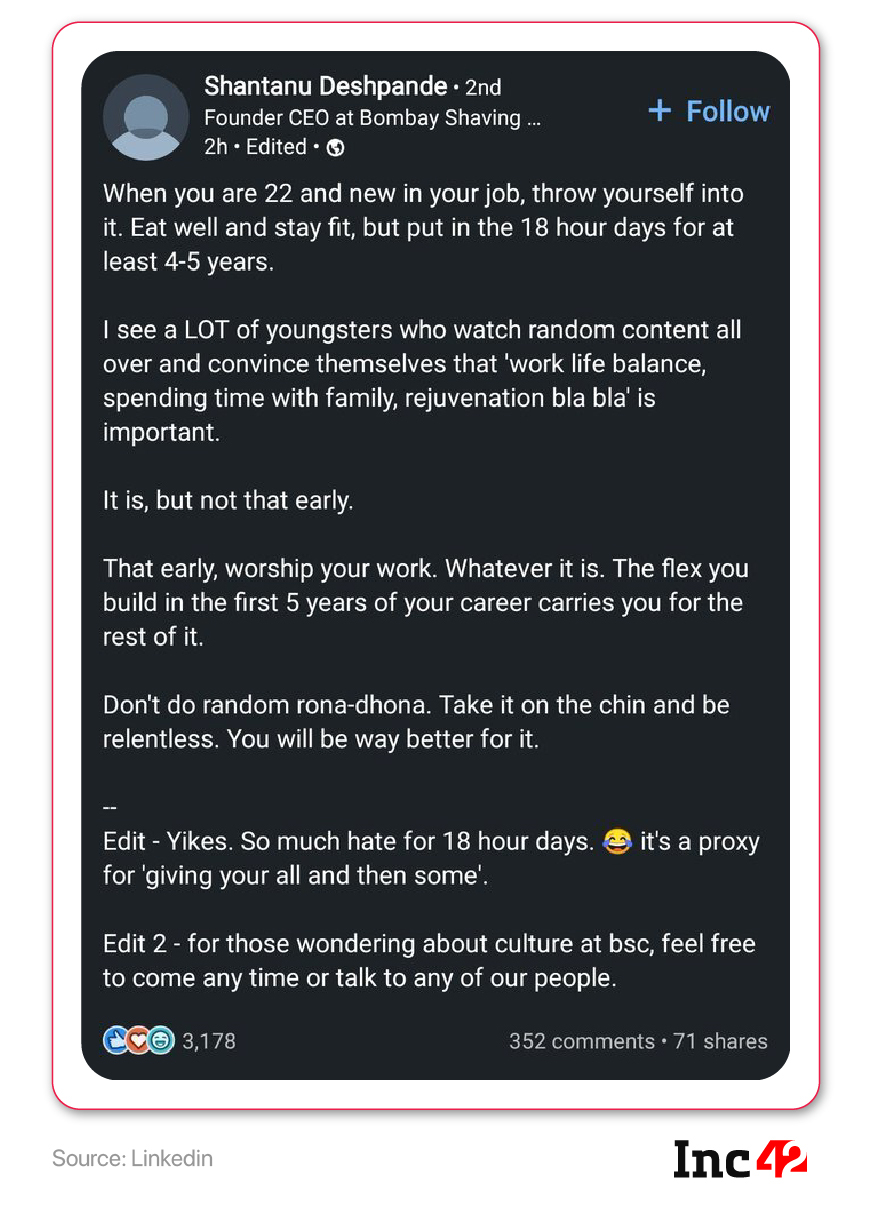
Whatever your stance on the matter, one must say that some of the comments directed at him were quite harsh, particularly the remarks about slavery. Perhaps Deshpande’s LinkedIn post lacked the nuance that we have heard from many founders on this issue since. So let’s break it down from the entrepreneur’s point of view, before bringing in what some startup employees have to say.
The Founder View
In the wake of the post, many commenters claimed that it’s not about the number of hours put in every day, but actually about commitment towards work and pushing the envelope when it comes to innovation.
It wasn’t just Deshpande’s post that drew the ire of social media. Healthtech unicorn Pristyn Care’s cofounder Harsimarbir Singh also waded into hot waters with a similar post that has also not gone down well.
Singh shared what he called interview hacks which involved a series of steps to assess the ability of candidates beyond their qualifications. He also posted about the ‘18 hours’ controversy saying special outcomes take great effort.
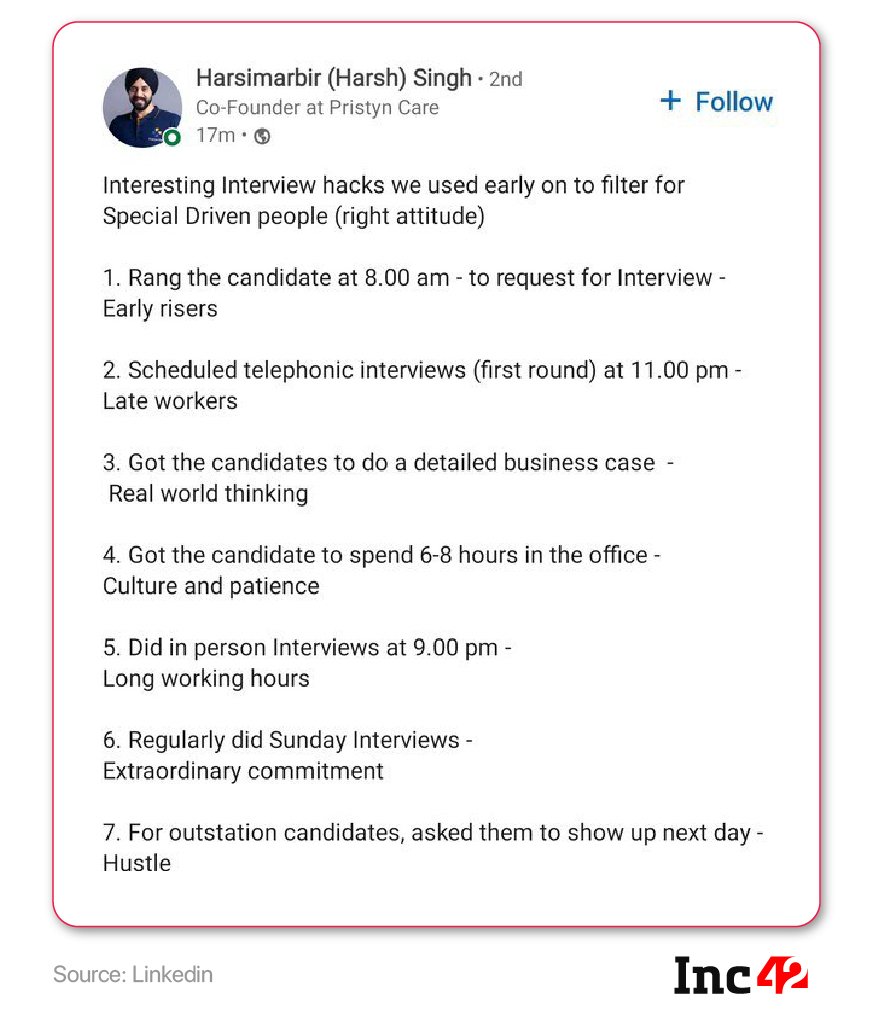
As the founder of a B2B ecommerce unicorn told us, “The responsibility of the founder is to convey the vision and communicate the mission in such a manner that these expectations remain unsaid.”
This, the founder said, keeps changing as the startup evolves. At an early stage, one usually has a tight-knit founding team, which does not require this hand-holding, but as the service or product scales up, the company adds employees that have a very diluted sense of the culture, vision and mission.
The expectation of certain hours of work will definitely feel less burdensome when the team around the founder feels the same sense of ownership, even if this ownership may not be backed by stocks.
In fact, as we will see one of the complaints from former employees at startups is that in the past two years so many new faces came in that it became like a factory and less like a startup. Many felt no connection to the vision or culture.
But others believe that Deshpande’s post is a classic case of misunderstanding social media. It is an open public forum and founders are not just posting as individuals but representing the company and its culture. Startup founders are increasingly being seen as role models and idols, and with that comes the responsibility of not commenting recklessly.
The founder of another D2C beauty brand told us that such issues should be limited to private town-halls and not public forums. Ironically, brands know the power of social media in spreading a message, so they should also know the message can be misconstrued just as easily.
After all, it is impossible to convey the context behind a post within that post. Most commenters might not get what stage the startup is at, what the market conditions are. Without these helpful indicators, there will be plenty of hot takes that don’t get the message.
The issue of overworking became a major problem in China in 2019, when tech industry workers rallied against the so-called 996 work culture, which led to online protests and even efforts by the government to censor this dissent.
The Employee View
When it comes to the employee point of view, the biggest complaint is that expectations from management are incompatible with how labour laws, gig worker safety and employee welfare policies are evolving globally.
The debates around four-day work weeks and permanent remote working have also trickled down to the Indian mainstream. There’s also some inertia with returning to the office after the pandemic as well.
Another argument from a former Bikayi employee is that after working from home, adjusting to the office environment will take time and that not everyone will be ready to immediately put in the time required. Only a certain profile of employee will be able to put in extra hours — it is harder for those with children at home, for example.
Then there’s the issue of layoffs and freezes on hiring, which has in many ways necessitated the extra hours. Indian startups have laid off over 12,000 employees since the beginning of 2022, but the need for scale and growth has not gone away.
The layoffs came after two years of rampant hiring where employees were brought in to expand but now those scaled-up businesses need to be managed by a smaller workforce. Naturally, there is a higher burden on the ones that are still being retained by companies.
In many cases, those left behind are not part of the core team and therefore have no sincere bonds with the company. It is a hollow job, as one former Relevel employee who is currently at Unacademy, told us last month.
A Question Of Startup Culture
Founders at early and late stage startups argue that ideas such as four-day weeks do not work in the Indian context, and paying employees for every extra hour they put in will result in higher costs which cannot currently be supported. It’s just not realistic to have such policies when companies are striving to grow.
Still, the unfortunate reality for employees at many of the high-growth unprofitable startups in India is that these are high-pressure businesses where every layer from founders to freshers need to prove their mettle. This definitely makes the work culture a key success factor.
We must add that startups continue to be some of the more progressive companies in India. We have seen the likes of Zomato, Swiggy and others introducing wellness leaves and mental health policies to help employees cope with pressures. And in the early weeks of Covid, founders launched funds to help employees too.
But the notion of “move fast and break things” implies that time is of the essence and therefore at most stages, disruption calls for longer hours than a steady 9-5 job that may work for a large company.
For a large corporate giant or a big tech company, resources are plentiful. But like startups, they too face the constraint of time. In that sense, time put in becomes a competitive moat in some ways.
Startup founders may have so far stepped in the mud when trying to convey this idea, but the nuance has to return when talking to the world at large and to employees. The talent wars and the challenge of retaining talent will not just be solved by money.
Perhaps, the current slowdown and the pressure to deliver growth and profits have distracted the startup ecosystem and founders from conveying their vision and culture. And if so, that may be another unfortunate casualty of the funding winter.
Tech Stocks & Startup IPO Tracker
- Zomato Bets On Hyperpure: Zomato claims its B2B vertical has a higher growth ceiling than the food delivery biz
- Jio IPO? Amid reports of Jio and Reliance Retail listing by year-end, Mukesh Ambani has clarified that IPO related details will be shared at the next AGM in 2023
Here’s how the past week has been for the listed tech companies we are tracking:
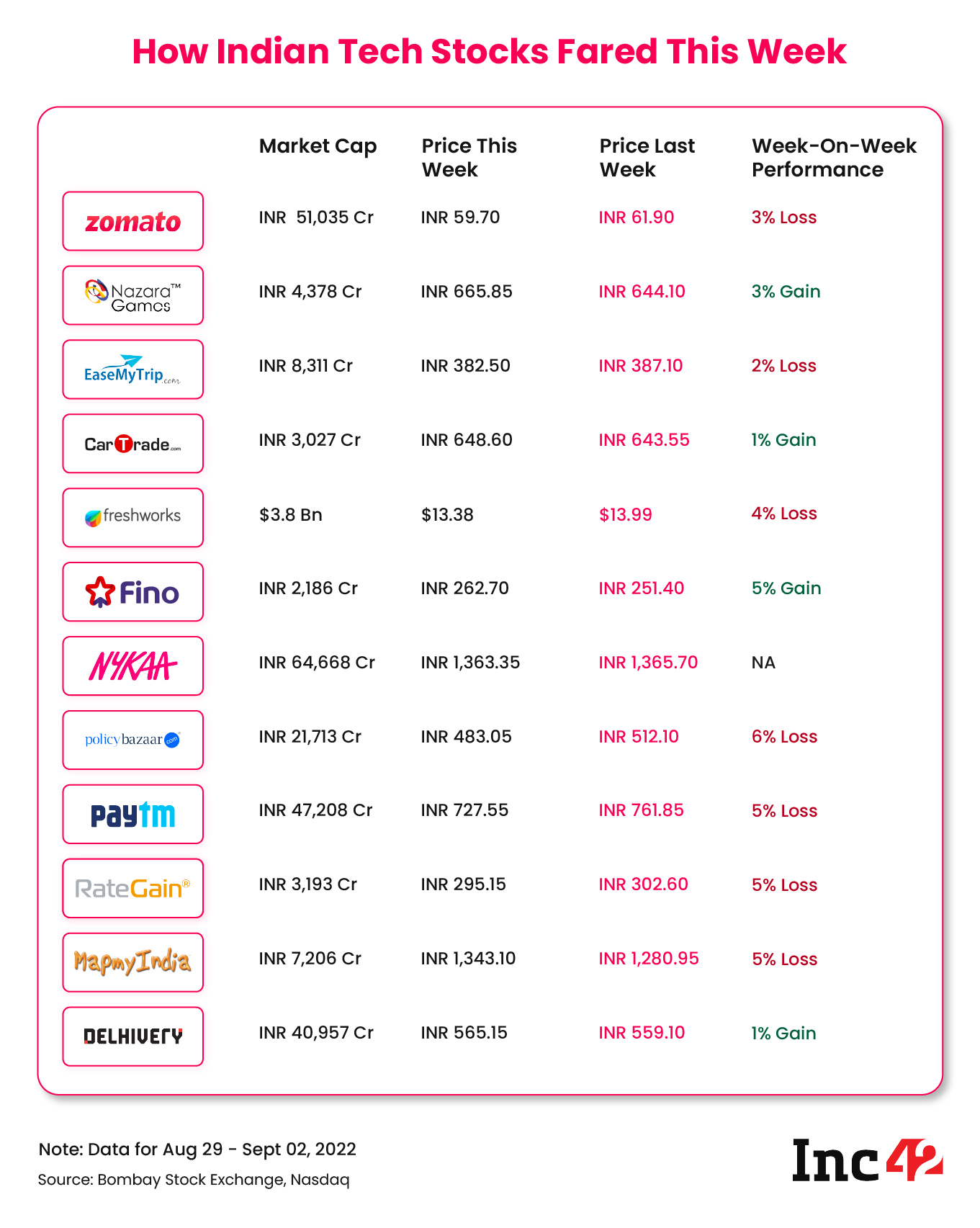
Startup Funding Tracker
- Weekly Funding Tally: Total funding in the last week of August and first few days of September plummeted, with the weekly deal count falling to its lowest in 2022. Only $180 Mn was raised by Indian startups this past week across just 19 investment deals
- August Funding: Funding in the past month remained flat in comparison to July with $1.1 Bn raised by startups, though the number of deals declined by over 20%
- Funding Projections: After a record-breaking 2021, funding momentum has slowed down this year, but the overall pace is expected to pick up by 2023. As per Inc42’s State Of The Indian Startup Ecosystem Report, startups are expected to reach $180 Bn in total funding by the end of next year. See our story for more such projections
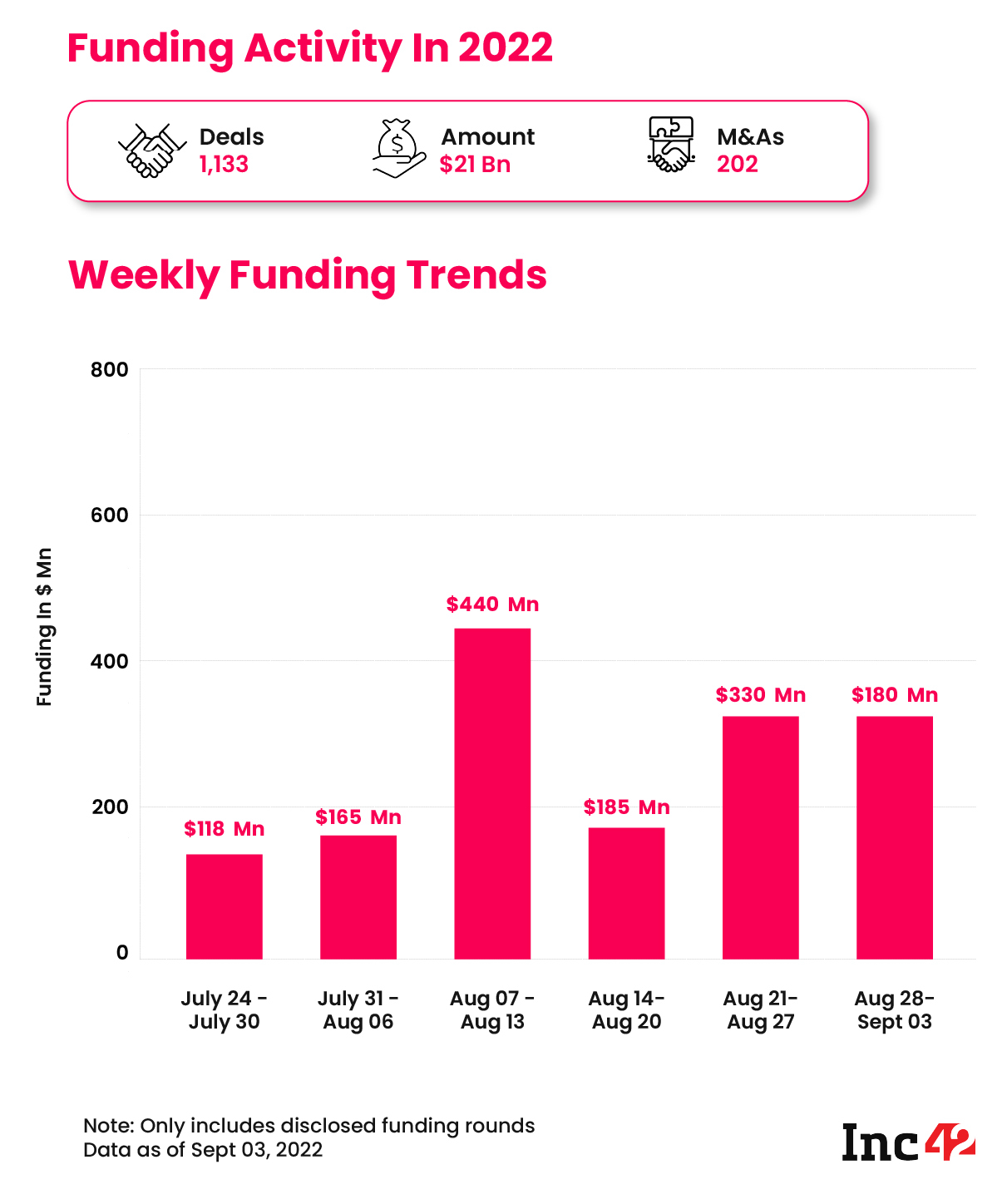
5G In India & Other Top Stories
That’s all for this Sunday. We’ll see you next week with another roundup.



